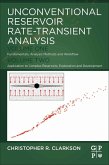Finally, modeling issues and requirements for analysis Gas and Power Vector-Coupling Technologies are presented and supported by real-world case studies and experimental examples. By uniquely analyzing issues from the whole energy system perspective, this book plays a pivotal role in supporting researchers and academicians in electrical, mechanical and energy engineering in their long-term decarbonization strategies.
- Includes a reliability assessment of cyber-physical power applications
- Presents practical methods, along with evidence from applications to real-world and simulated coupled energy systems
- Provides sample computer codes/pseudocodes and analytical examples for the presented methods
Dieser Download kann aus rechtlichen Gründen nur mit Rechnungsadresse in A, B, BG, CY, CZ, D, DK, EW, E, FIN, F, GR, HR, H, IRL, I, LT, L, LR, M, NL, PL, P, R, S, SLO, SK ausgeliefert werden.









